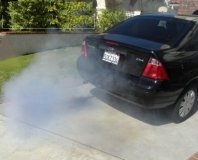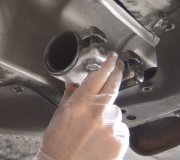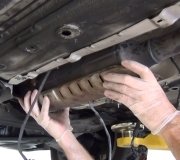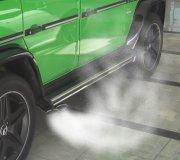Hello
Well, tough questions. It seems like you have a really good car here. Obviously with the damage you have, the repairs, the insurance company, there is some emotion wrapped up in this too. So I will try to be as logical as I see from an outside view.
As I said, looks like a great car and you have kept up on the maintenance. Normally blue smoke as you know is oil. Oil is getting into the cylinders and coming out the tail pipe. It does have 114600 miles on it. The engine has had a work out. To me it is about that time certain things like this may start.
I attached a pic for your review. If you look at item 12, those are valve seals. They are like little umbrellas. As the oil is splashed around and runs all over the valves and things, the oil runs off the seals back into the engine. If those seals go bad, the oil runs down the valve stem into the cylinder thus out the tail pipe.
You said the air filter was drenched. By chance did you happen to check the oil to see if there was water in it?
My thought. . ..see what you think. The seals have 114600 miles on them. Most likely the only thing keeping them somewhat okay, i.e., not becoming too much more brittle is the fresh oil running all over them.
The car sits for almost 3 weeks. It is started and since they have dried out some they are not working as well. They are under a lot of pressure with the valve moving all the time. The car sits another week. Now it is driven again.
To me, unless the water was so full in the engine that it was inside the valve covers so the seals were soaking in water. . ...it may be hard to prove the flood is what did it. If the car did not have that many miles on it. . ...even though you have taken great care of it. . ..miles are miles.
I feel the sitting had more affect than the water. Do you see my logic there? Especially with the miles. Now if you only had 50000 miles that may be different. But I think it was close to time anyway and the sitting may have sped things up.
Now can the oil burn off. . .. . .well yes, if oil has built up. But if it continues then it is back to the seals needing changed. It is interesting that it didn't happen until getting the car back but that is why I wanted to give you the pic and some explanation on the seals and see if it makes sense to you.
I am sure this isn't what you want to hear but I want to be as honest as I can. If you do decide to get the seals fixed, I would suggest doing a valve job at the same time. That is removing the heads, replacing the head gaskets, reworking the valves etc.
I hope this at least gives you a better understanding. Good luck
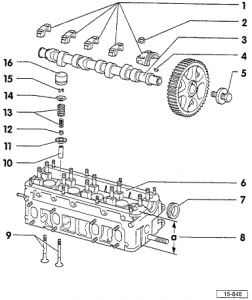
Friday, October 31st, 2008 AT 8:20 PM

